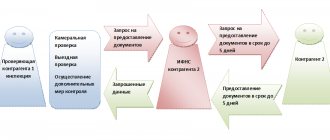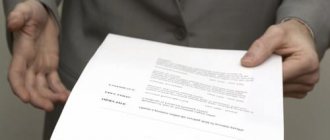Requests during inspections and outside inspections
Situations when tax inspectors have the right to request any documents or information from an organization or entrepreneur can be divided into two large groups.
Firstly, such powers arise with the Federal Tax Service when carrying out inspections (on-site or office) of the taxpayer to whom the request is sent. Secondly, tax authorities may require documents (information) from organizations or individual entrepreneurs for which no inspections have been scheduled. This is possible if the documents were required during the verification of a counterparty that is associated with the addressee of the request. In addition, documents may be requested outside the framework of any inspection if they relate to a specific transaction about which the Federal Tax Service has doubts.
Check the counterparty for signs of a shell company
Today we will examine in detail issues related to the legality of the requirements presented by inspectors as part of tax audits. The second article in the series will be devoted to “non-verification” requests.
Requirements for on-site inspections
Let's start with the requirements for taxpayers who are subject to on-site tax audits (ATA). Since such checks cover a small percentage of organizations and entrepreneurs, the corresponding requirements are raised infrequently. But it is within the framework of the GNP that tax authorities can request from taxpayers the widest range of documents.
It would seem that an on-site inspection assumes that inspectors are present on the taxpayer’s premises and therefore can take any papers they need themselves. However, as a rule, the GNP is accompanied by a large number of requests for the production of documents. Such requirements are set within the framework of an article of the Tax Code of the Russian Federation, which does not limit tax authorities either in the number of such requests or in the list of required documents, data and information. What does this mean in practice?
Determine the likelihood of an on-site tax audit and receive recommendations on the tax burden
The Russian Ministry of Finance clarified that, in accordance with an article of the Tax Code of the Russian Federation, any documents can be requested from the taxpayer, including those not provided for by tax legislation and accounting legislation (letter dated October 14, 2013 No. 03-06-06-01 /42704 and dated 05.08.08 No. 03-02-07/1-336). There are also court decisions from which it follows that within the framework of the GNP, it is possible to request both documents drawn up in established forms, and additional information necessary to verify the correctness of tax calculation (including in the form of calculations, tables, certificates). As an example of such a decision, we cite the resolution of the Federal Antimonopoly Service of the East Siberian District dated July 25, 2006 No. A33-31096/05-F02-3658/06-S1.
Thus, if during an on-site audit the taxpayer receives a request to submit documents, then it will have to be fulfilled. But first you need to make sure that the requirement itself is formatted correctly. In particular, it is necessary to make sure that it comes from the inspectorate that organized this inspection, is addressed specifically to the taxpayer in respect of whom the IRR is being carried out, and contains a link to the article of the Tax Code of the Russian Federation. You also need to check whether the requirement is signed by an official of the Federal Tax Service (this may be the head of the inspectorate or his deputy, or any of the inspectors specified in the decision to conduct an internal tax inspection). And finally, it is important that the requirement contains information that allows you to identify the documents (information) that need to be prepared.
Submit tax reports for free and respond to the requirements of the Federal Tax Service via the Internet
When can the submission of documents (information) be refused?
The most common formal violations that lead to invalidity of a claim:
- There is no instruction attached to the request;
- The requirement was drawn up by an unauthorized person, for example, an official of an inspectorate with which you are not registered;
- The requirement (instruction) was not drawn up in the form prescribed by Order of the Federal Tax Service of Russia dated November 7, 2018 No. ММВ-7-2/ [email protected] “On approval of document forms provided for by tax authorities when exercising their powers...”. We are talking about a situation where, instead of a demand, the taxpayer is sent an “information letter” or another request not provided for by the Tax Code of the Russian Federation. Through such requests, tax authorities try to obtain information outside the audit deadlines or information that they cannot formally request. Whether to meet the inspector halfway or not in such a situation is purely the right of the taxpayer.
- The requirement was issued after the end of the tax audit. Important!
If a demand is made during an audit, but is received by the taxpayer after its completion, such a demand is recognized as legal.
- Documents and information were submitted to the inspection earlier.
- The requested documents and information do not relate to the period being audited or the subject of the audit.
This basis for refusal is fraught with several pitfalls.
Firstly, the connection between the requested documents and the verification period may exist, but may not be very obvious.
For example, an agreement may be dated to a previous period, but extend its validity to subsequent periods. Or the transaction may be completed in an earlier period, but affect the taxation of the next period for which the audit is carried out. In such cases, the demand will be legal.
Secondly, the connection between the requested documents (information) and the subject of the inspection may be indirect, but sufficient for the court to recognize such a request as lawful. In such cases, courts often comment in their decisions that the taxpayer is not given the opportunity to control and resolve the issue of the relevance of the evidence collected by the tax authority to the subject of the audit, since the decision on the need to require certain information for conducting a tax audit is the exclusive prerogative of the tax authorities.
Here you need to be careful and understand that the documents (information) must be clearly and definitely not related to the subject or the inspection period.
Requirements for desk audits
During desk audits, tax officials can no longer request any documents related to the calculation and payment of taxes. The fact is that the powers of inspectors to issue such demands are limited by the provisions of the article of the Tax Code of the Russian Federation, which regulate the “camera chamber” procedure.
Thus, according to paragraph 7 of Article of the Tax Code of the Russian Federation, during a desk audit, the tax authority has the right to request additional information and documents from the taxpayer only in cases expressly provided for by this article. Let us note that there are almost two dozen such cases (even if we do not take into account the rather rare situations with requests for documents from organizations working with Russian duty-free and investment partnerships). For convenience, we have tabulated the most common reasons for submitting demands within the framework of “camera chambers”.
| Situation | What the Federal Tax Service may require | Norm of the Tax Code of the Russian Federation | Note |
| Errors were identified in the declaration (calculation) | Written explanations or updated declaration (updated calculation) | clause 3 art. Tax Code of the Russian Federation | The Federal Tax Service has this right when checking any declarations and calculations. The essence of the identified errors, contradictions or inconsistencies does not matter. It also does not matter whether they lead to an understatement of the tax amount according to the declaration (calculation). Please note that the 2-NDFL certificate is not a declaration (calculation). Consequently, when checking it, tax authorities cannot require explanations or a corrective 2-NDFL certificate. |
| Contradictions were identified between the information contained in the declaration (calculation) | |||
| Contradictions were identified between the declaration (calculation) and the documents submitted with it (with it) | |||
| A discrepancy was identified between the information presented (declaration data, calculations, attached documents) and the data available to the Federal Tax Service | |||
| The declaration (calculation) states a loss | Explanations justifying the amount of loss | ||
| A “clarification” is presented with the amount of tax to be reduced | Explanations justifying changes in indicators | The period for which the “clarification” was submitted does not matter. | |
| “Updated” was presented two years after the deadline for submitting reports | Documents confirming changes in information in the relevant indicators, and tax registers that reflect the indicators before and after the changes | clause 8.3 art. Tax Code of the Russian Federation | Documents and registers can be requested if the “clarification” states the amount of tax to be reduced or the loss increased. |
| The declaration states benefits | Explanations about transactions (property) for which benefits are applied, and (or) documents confirming the right to benefits | clause 6 art. Tax Code of the Russian Federation | In terms of VAT, not all transactions specified in Article 149 of the Tax Code of the Russian Federation are subject to the benefit, but only those that refer to specific groups of taxpayers (canteens of educational organizations, medical organizations, etc.). Such “preferential” categories of taxpayers are listed in subparagraph. 2, 4-7, 7.1, 12.1, 12.2, 14, 14.1, 16.1, 17, 17.2, 20 and 32 clause 2, sub. 1-5, 7, 11, 13-16, 18, 20, 23.1, 27, 29, 30 and 33 p. 3 art. 149 of the Tax Code of the Russian Federation. The remaining operations listed in Article 149 of the Tax Code of the Russian Federation do not fall under the benefit. For example, loan operations or sales of software based on licensing agreements. In these cases, tax authorities cannot request supporting documents. |
| The VAT return claims a refund | Documents confirming the right to deductions | clause 8 art. Tax Code of the Russian Federation | We are talking about a situation where the amount of deductions is greater than the amount of VAT on sales (only in this case, on the basis of Article 176 of the Tax Code of the Russian Federation, the right to a tax refund appears). |
| There are contradictions between the information about transactions in the VAT return | Any documents related to the relevant transactions | clause 8.1 art. Tax Code of the Russian Federation | A demand may be sent if contradictions or inconsistencies clearly indicate an understatement of the amount of VAT payable or an overstatement of the amount of VAT claimed for reimbursement. |
| Information about transactions in the VAT return does not correspond to data about the same transactions submitted to the Federal Tax Service by other taxpayers | |||
| The excise tax declaration states deductions in connection with the return of sold excisable goods | Documents confirming the return of goods | clause 8.4 art. Tax Code of the Russian Federation | |
| Reduced rates are applied in the calculation of insurance premiums | Documents confirming the right to apply reduced tariffs | clause 8.6 art. Tax Code of the Russian Federation | |
| The calculation of insurance premiums reflects amounts not subject to contributions | Documents confirming the validity of reflecting such amounts | ||
| An investment deduction is claimed in the income tax return | Documents confirming the right to deduction | clause 8.8 art. Tax Code of the Russian Federation | |
| A declaration on land, water tax or mineral extraction tax has been submitted | Documents that serve as the basis for the calculation and payment of tax | clause 9 art. Tax Code of the Russian Federation | |
| The declaration (calculation) is submitted by an organization participating in a regional investment project, which enjoys the corresponding benefits | Documents confirming compliance of project implementation indicators with the requirements for such projects and (or) their participants | clause 12 art. Tax Code of the Russian Federation |
Carry out automatic reconciliation of invoices with counterparties
Let us repeat that, due to the direct indication of paragraph 7 of Article of the Tax Code of the Russian Federation, the list of grounds for issuing demands within the framework of “camera chambers” is closed (we have given most of the grounds in the table). In other situations that may arise during desk audits, tax officials do not have the right to send requests for documents or demand clarification. If this does happen, then such requests are illegal. Consequently, they can not be fulfilled without fear of being subject to tax liability. Such clarifications were given both by the Ministry of Finance of Russia (letter dated 03/02/17 No. 03-02-07/1/12009, see “Ministry of Finance: Tax authorities do not have the right to demand from taxpayers documents confirming the right to apply reduced tax rates”), and the Federal Tax Service of Russia (letter dated 02.22.17 No. ED-4-15/3411 and clause 7.7 of letter dated 07.17.13 No. AS-4-2/12837). Judges adhere to a similar position (resolutions of the Presidium of the Supreme Arbitration Court of the Russian Federation dated 04/08/08 No. 15333/07, Arbitration Court of the Moscow District dated 06/01/16 No. F05-5927/2016).
What sanctions are provided for violators?
Taxpayers who are required to report to the Federal Tax Service in electronic form, but have not ensured the opportunity to receive electronic documents from the inspectorate, will have their bank accounts blocked by the tax authorities. The same thing will happen if the taxpayer does not send the tax authorities a receipt of receipt of the electronic demand (subclause 1.1 and subclause 2, clause 3, article 76 of the Tax Code of the Russian Federation).
For failure to submit on time the documents requested as part of the audit (which, according to the inspectors, the taxpayer has), a fine is provided on the basis of paragraph 1 of Article 126 of the Tax Code of the Russian Federation. Its amount is 200 rubles for each document not submitted.
If the counterparty of the inspected taxpayer refused to send the documents requested from him about this taxpayer (despite the fact that such documents are available), the inspectors will issue a fine under paragraph 2 of Article 126 of the Tax Code of the Russian Federation in the amount of 10,000 rubles.
An unjustified refusal to provide information about a specific transaction entails a fine of 5,000 rubles under clause 1 of Article 129.1 of the Tax Code of the Russian Federation, and for a repeated refusal within a year the fine will be 20,000 rubles (clause 2 of Article 129.1 of the Tax Code of the Russian Federation).








